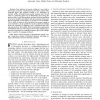Free Online Productivity Tools
i2Speak
i2Symbol
i2OCR
iTex2Img
iWeb2Print
iWeb2Shot
i2Type
iPdf2Split
iPdf2Merge
i2Bopomofo
i2Arabic
i2Style
i2Image
i2PDF
iLatex2Rtf
Sci2ools
140
click to vote
JSAC
2007
2007
Semantic social overlay networks
— Peer selection for query routing is a core task in peer-to-peer networks. Unstructured peer-to-peer systems (like Gnutella) ignore this problem, leading to an abundance of network traffic. Structured peer-to-peer systems (like Chord) enforce a particular, global way of distributing data among the peers in order to solve this problem, but then encounter problems of network volatility and conflicts with the autonomy of the peer data management. In this paper, we propose a new mechanism, INGA, which is based on the observation that query routing in social networks is made possible by locally available knowledge about the expertise of neighbors and a semantics-based peer selection function. We validate INGA by simulation experiments with different data sets. We compare INGA with competing peer selection mechanisms on resulting parameters like recall, message gain or number of messages produced.
Related Content
| Added | 16 Dec 2010 |
| Updated | 16 Dec 2010 |
| Type | Journal |
| Year | 2007 |
| Where | JSAC |
| Authors | Alexander Löser, Steffen Staab, Christoph Tempich |
Comments (0)

